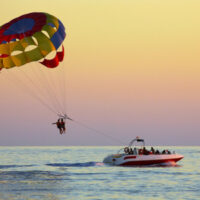Who’s Liable for Parasailing Accident Injuries in Florida?

Parasailing is an extreme and dangerous sport where a person is dangled above the water on a rope. A passenger on a speedboat is dangled up hundreds of feet in the air with a parasailing wing and harness towed by the boat.
Often, there are multiple parasailing passengers attached to a boat at a time. The operator of the speedboat controls the movement of the wing and determines where the passengers would land.
Parasailing is a popular sport among thrill-seekers in Florida. While parasailing is a thrilling water sport, it can be very dangerous. Parasailing accidents are bound to happen when safety precautions are not taken. When owners and operators of vessels used for parasailing fail to take safety precautions, they can be held liable for your parasailing accident injury.
Parasailing Accident in Key West, Florida
The danger of parasailing was evident in a recent incident in Key West. As reported by the Miami Herald, a man died and a woman was critically injured during a Sunset Watersports sail. The fatal parasailing accident happened in the Northwest Channel.
The man and woman, both tourists, were being lifted into the air by a speedboat when they fell into the water. The Florida Fish and Wildlife Conservation Commission issued a report in which it said that “severe weather” was a contributing factor to the parasailing accident.
The woman was taken to Jackson Memorial Hospital in critical condition. At the time of the boating accident, there were 10 other people on the 31-foot commercial boat.
Causes of Parasailing Accidents in Florida
A parasailing accident injury can occur due to a combination of factors. Common causes of parasailing accidents include:
- Defective equipment
- Adverse weather conditions
- High winds
- Boat operator error
- Faulty harness
- Inaccurate weather-tracking devices
- Improper training of staff
- Improper water landings
- Unsafe proximity to other parasailing passengers
- Failure to properly instruct passengers
- Becoming entangled in the ropes
- Improper landing on the deck or shore
- Collisions with obstacles and other objects on the water and shore
Liability in Parasailing Accidents in Florida
Before 2014, parasailing was largely unregulated in Florida. The finding that parasailing lacked the necessary oversight and regulation prompted lawmakers to pass the White-Miskell Act. The Act, also known as the White-Miskill Act, took effect on October 1, 2014.
While the Act helped prevent many parasailing accidents and injuries, many parasailing operators fail to comply with the requirements. The White-Miskell Act contains the following provisions:
- Operators must keep a weather log;
- Operators are not allowed to engage in parasailing activity in adverse weather conditions, including high wind and rain;
- Appropriate weather-tracking equipment is required to monitor weather reports in the area;
- A minimum of $1 million in liability insurance is mandatory for all parasailing operators;
- All parasailing operators must have a license from the Coast Guard; and
- Operators must comply with Federal Aviation Administration (FAA) regulations related to parasailing activity, including the use of specific visibility markings on the parasails, not flying higher than the maximum allowable altitude (400 feet above the ground), and other requirements.
If you sustained a parasailing accident injury, do not hesitate to speak with a Miami personal injury attorney to determine liability in your case. Contact our lawyers at Pita Weber Del Prado to establish fault in your parasailing accident. Call at 305-670-2889.
Resource:
miamiherald.com/news/local/community/florida-keys/article244310487.html



